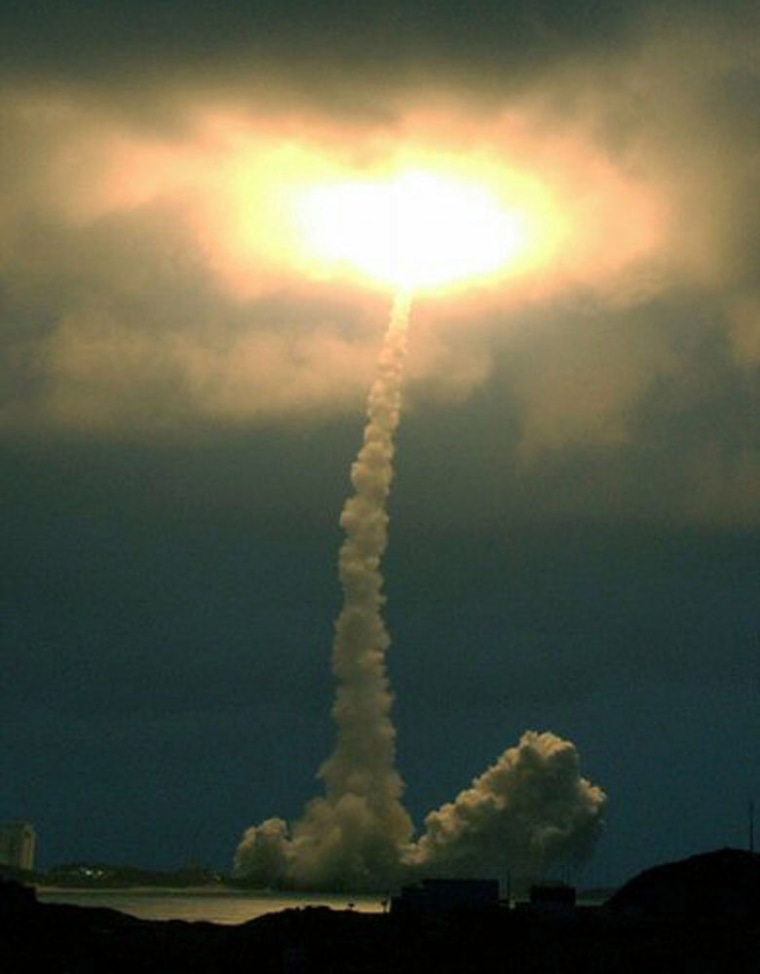Fifteen months after Japan’s last liftoff ended in a spectacular fireball, an orange and white H-2A rocket blasted off Saturday on a mission officials hope will revive this country’s once proud space program — now languishing in China’s shadow.
The 174-foot-tall rocket, with the word “Nippon,” or Japan, emblazoned on its side, lifted off into a cloudy sky just before sunset from the sprawling space center on this remote southern island. The rocket carried a multipurpose weather and navigation satellite.
About 40 minutes later, mission control announced the rocket had successfully delivered its payload into orbit.
Japan’s space agency, JAXA, was counting on a successful launch to help revive the reputation of the H-2A, which serves as the centerpiece of this country’s space program, and to demonstrate that Japan remains a viable contender in an increasingly heated Asian space race with China.
Last month, Beijing announced it will send two astronauts into orbit for up to five days in September or October. China, which is believed to have earmarked $20 billion for its manned program, hopes to put an unmanned vehicle on the moon by 2010.
Though loathe to admit it, Japanese space agency officials have been shaken by China’s advances.
“We aren’t especially conscious of China,” Mamoru Endo, a senior official with the Japan Aerospace Exploration Agency, said, noting that the two nations’ space programs have very different objectives.
But he acknowledged a government panel recommended last year that Japan, which has focused on unmanned, scientific probes, consider a manned space program over the next decade. He also said that, although the space agency’s budget has been generally declining, there is growing political support for increasing it in the near future.
Space race gets crowded
China’s lofty ambitions have caught the attention of Washington as well.
Mindful of the Chinese challenge but careful to call it a “journey and not a race,” President Bush has outlined an ambitious plan to put an astronaut back on the moon by 2020 and send Americans to Mars, a program that could cost a whopping $400 billion.
Other players are also becoming more active in the space game — though they have a lot of catching up to do:
- India, with an annual space budget of $300 million, has developed rockets able to fire satellites into orbit, and short-and medium-range missiles. India plans to launch 40 satellites capable of collecting images of Earth from space by 2008 and send a manned mission to the moon before 2015.
- Pakistan, which like India has developed advanced missile capabilities in tandem with its nuclear weapons program, is bolstering its space ambitions and has been working on its own satellites.
- Iran said in January that it will launch a satellite with its own rocket within 18 months, which would make it the first Islamic country with the technology to do so.
- North Korea claimed to have launched its first satellite in 1998 and said it was successfully broadcasting praises of leader Kim Jong Il from orbit. That has been disputed by experts in Japan and the United States, who believe the launch was merely a test of the communist state’s Taepodong I missile technology.
In any case, the North Korean program is transforming Japan’s effort, which has a budget of $2.5 billion for the current fiscal year.
Japan launched its first spy satellites — part of a long-term, $2 billion program aimed primarily at keeping watch on North Korea’s missile and nuclear activities — aboard an H-2A in March 2003. Two more are awaiting launch to replace those lost that November.
The program, championed by Prime Minister Junichiro Koizumi, was strongly criticized as a departure from Japan’s policy of the non-militarization of space. But space agency officials say the satellites are not a threat to North Korea or any other nation.
